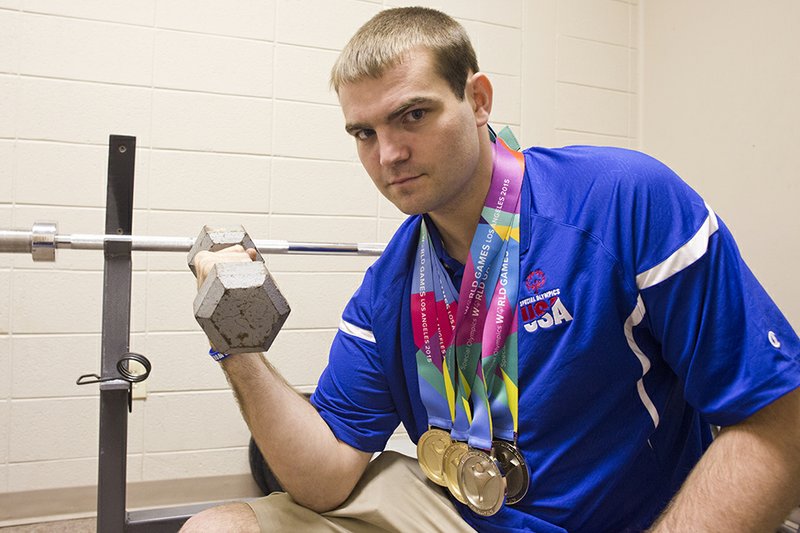Bryson Williford knows that hard work and training can pay off, but sometimes taking the first step into a new venture is the hardest part. The 23-year-old Rosie man returned from the Special Olympics World Games earlier this summer with two gold medals and two silver medals, and he said he hopes his success inspires other special athletes to push themselves in their sports.
“Always give it at least one shot,” he said. “If you’re scared of failing and don’t take that one shot, then you’re failing anyway. You’ve got to try, and you can be successful.”
This year, Williford was one of four Arkansans to compete in the Special Olympics World Games in Los Angeles. He won gold medals in the male bench-press and male combination all-lift events, and he won silver medals in the male dead-lift and male squat-lift events.
Williford is no stranger to sports. He said he has been lifting weights since he was in the seventh grade and playing football when he was a student at Southside High School near Batesville. Williford now attends New Directions, a clinic in Batesville that serves adults with developmental challenges, and utilizes its weight room to train.
As a Special Olympics athlete since 2010, Williford said he has played a lot of sports and has traveled many times to many
places for competitions. Last year he was a captain for the Team Arkansas flag football team, which took home the bronze medal in Division 1 at the USA Games.
“I participate in pretty much every sport Special Olympics Arkansas has to offer,” he said. “I stay active. With Special Olympics, I have to train all year round. You can’t just sit around all day.”
Going to the World Games this year was a neat experience, Williford said. His coaches helped him strategize so he could stay competitive during all of his events.
“I was nervous to an extent,” he said. “I was really, really nervous when they were fixing to call my name for my first lift. It was squat, so we wanted to stay as light as possible so I could get on the board and get a medal. If you don’t make a lift at all, you get a participation ribbon. I didn’t want that.”
After that first lift, Williford said, his nerves had calmed down, and he was ready to compete. When he wasn’t involved in an event, he watched other athletes participate in their sports and said he was impressed by the talent in the arena.
“You can look around and say, ‘Wow, I would have quit running that mile,’” he said, “But they all pushed themselves. They go all out.”
After winning his medals, Williford said, he was treated like a celebrity by other athletes and spectators.
“I came back around to watch my other teammates lift, and I couldn’t even make it to the place where they were lifting,” he said. “It took me nearly an hour and a half to get from the medal stand because people wanted to take pictures and stuff. Kids wanted me to sign their hats and posters. It was a neat deal.”
Williford already has plans to continue competing in Special Olympics and other
competitions. He said it is fun to win medals, but he hopes other athletes with special needs will take their first steps to compete, whether or not they place.
“Everybody’s a winner,” he said. “Like Muhammad Ali said, ‘Don’t quit. Suffer now and live the rest of your life as a champion.’”
Staff writer Angela Spencer can be reached at (501) 244-4307 or aspencer@arkansasonline.com.
